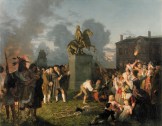More from the Review
Subscribe to our Newsletter
Best of The New York Review, plus books, events, and other items of interest
Advertisement
More from the Review
Subscribe to our Newsletter
Best of The New York Review, plus books, events, and other items of interest

The Color Line
W.E.B. Du Bois’s exhibit at the 1900 Paris Exposition offered him a chance to present a “graphical narrative” of the dramatic gains made by Black Americans since the end of slavery.
W.E.B. Du Bois’s Data Portraits: Visualizing Black America: The Color Line at the Turn of the Twentieth Century
edited by Whitney Battle-Baptiste and Britt Rusert
Black Lives 1900: W.E.B. Du Bois at the Paris Exposition
edited by Julian Rothenstein, with an introduction by Jacqueline Francis and Stephen G. Hall
A History of Data Visualization and Graphic Communication
by Michael Friendly and Howard Wainer
August 19, 2021 issue

Rebellious History
How should historians construct a more complete and truthful version of the past?
Wayward Lives, Beautiful Experiments: Intimate Histories of Riotous Black Girls, Troublesome Women, and Queer Radicals
by Saidiya Hartman
October 22, 2020 issue

The Real Texas
People go to Texas seeking fortunes, hoping to find a place somewhere between what is real and what is myth; it is strange and disturbing that this hope resembles the feeling that brought Anglo settlers, along with the people they enslaved, into the region so long ago.
In a Narrow Grave: Essays on Texas
by Larry McMurtry, with an introduction by Diana Ossana
God Save Texas: A Journey into the Soul of the Lone Star State
by Lawrence Wright
The Injustice Never Leaves You: Anti-Mexican Violence in Texas
by Monica Muñoz Martinez
Big Wonderful Thing: A History of Texas
by Stephen Harrigan
America’s Lone Star Constitution: How Supreme Court Cases from Texas Shape the Nation
by Lucas A. Powe Jr.
October 24, 2019 issue

MLK: What We Lost
Figures like Martin Luther King, Harriet Tubman, and Rosa Parks have now become “safe” in ways they never were when they were operating at the height of their powers.
To the Promised Land: Martin Luther King and the Fight for Economic Justice
by Michael K. Honey
Redemption: Martin Luther King Jr.’s Last 31 Hours
by Joseph Rosenbloom
The Heavens Might Crack: The Death and Legacy of Martin Luther King Jr.
by Jason Sokol
The Seminarian: Martin Luther King Jr. Comes of Age
by Patrick Parr
To Shape a New World: Essays on the Political Philosophy of Martin Luther King, Jr.
edited by Tommie Shelby and Brandon M. Terry
November 8, 2018 issue

Female Trouble
‘What Happened’ by Hillary Rodham Clinton
What Happened
by Hillary Rodham Clinton
February 8, 2018 issue

Our Trouble with Sex: A Christian Story?
Geoffrey Stone’s ‘Sex and the Constitution: Sex, Religion, and Law from America’s Origins to the 21st Century’
Sex and the Constitution: Sex, Religion, and Law from America’s Origins to the Twenty-First Century
by Geoffrey R. Stone
August 17, 2017 issue

The Captive Aliens Who Remain Our Shame
On the origins of racial exclusion in the society that would become the United States of America.
The Common Cause: Creating Race and Nation in the American Revolution
by Robert Parkinson
January 19, 2017 issue
Free calendar offer!
Subscribe now for immediate access to the latest issue and to browse the rich archive. You’ll save 50% and receive a free David Levine 2025 calendar.
Subscribe now
Give the gift they’ll open all year.
Save 65% off the regular rate and over 75% off the cover price and receive a free 2025 calendar!